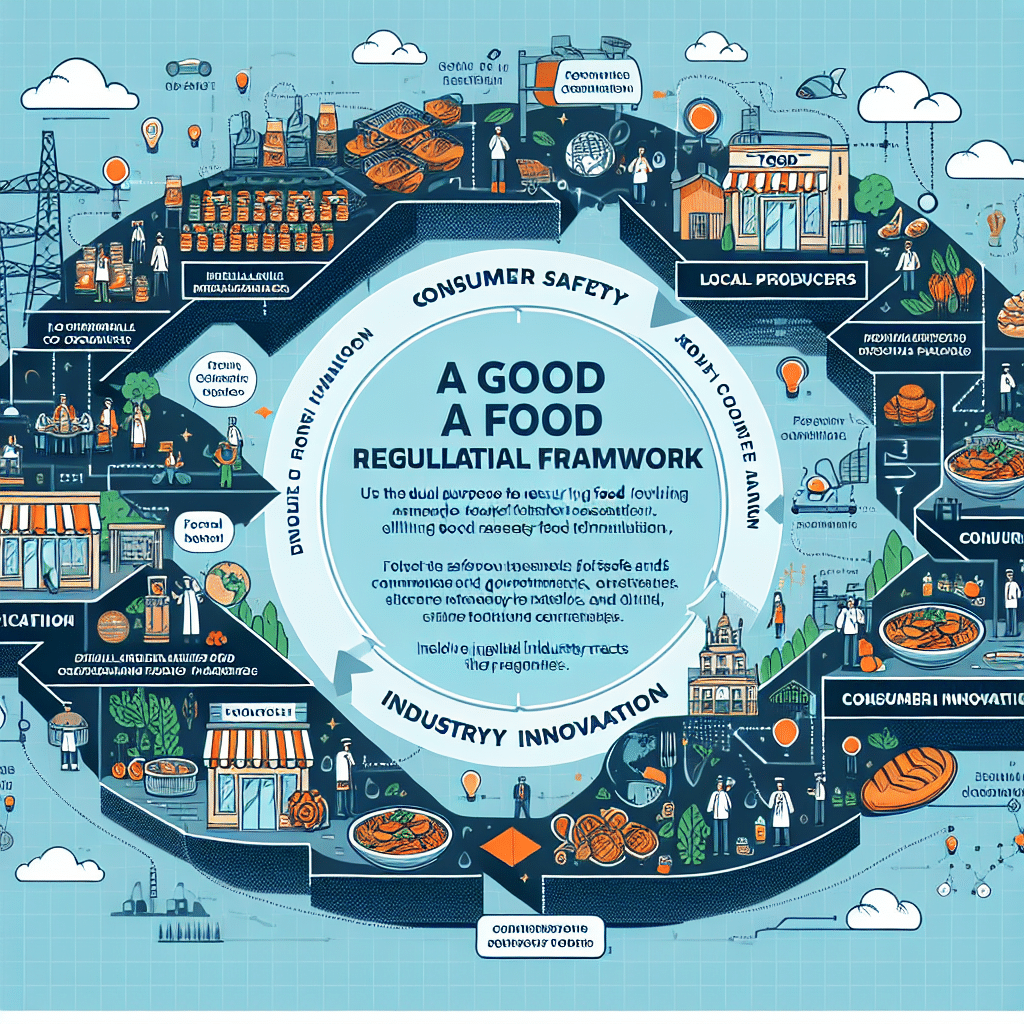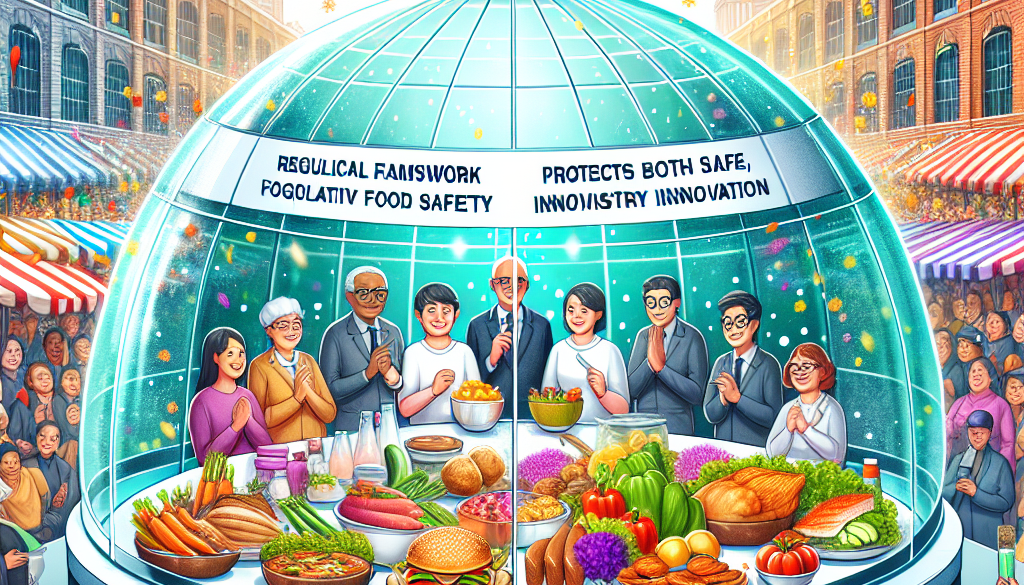A Good Food Regulatory Framework to Ensure Consumer Safety and Industry Innovation
-
Table of Contents
- Ensuring Consumer Safety and Fostering Industry Innovation through Effective Food Regulatory Frameworks
- The Cornerstones of a Good Food Regulatory Framework
- Science-Based Regulations
- Transparency and Public Engagement
- Flexibility and Adaptability
- International Harmonization
- Enforcement and Compliance
- Impact on Consumer Safety
- Encouraging Industry Innovation
- Case Studies: Successes in Food Regulation
- Challenges and Future Directions
- Conclusion
- Discover ETprotein’s High-Quality Protein Products
Ensuring Consumer Safety and Fostering Industry Innovation through Effective Food Regulatory Frameworks

The safety of the food supply is a paramount concern for consumers, governments, and the food industry alike. A robust food regulatory framework is essential to ensure that food products are safe for consumption and that the industry can innovate while maintaining high safety standards. This article explores the importance of a good food regulatory framework, its impact on consumer safety, and how it can encourage industry innovation.
The Cornerstones of a Good Food Regulatory Framework
A well-designed food regulatory framework should be built on several key principles to effectively protect consumers and promote industry innovation:
- Science-based regulations
- Transparency and public engagement
- Flexibility and adaptability
- International harmonization
- Enforcement and compliance
Science-Based Regulations
Regulations should be grounded in rigorous scientific research and risk assessment. This approach ensures that safety standards are based on evidence rather than conjecture, providing a clear and justifiable basis for regulatory decisions.
Transparency and Public Engagement
Regulatory processes must be transparent, with opportunities for public input. This openness builds trust in the regulatory system and allows for a diverse range of perspectives to inform policy-making.
Flexibility and Adaptability
The food industry is dynamic, with new technologies and products constantly emerging. Regulations must be flexible enough to accommodate innovation while still ensuring safety.
International Harmonization
With global food trade, international standards and harmonization of regulations are crucial. This ensures that safety standards are consistent across borders, facilitating trade and protecting consumers worldwide.
Enforcement and Compliance
Effective enforcement mechanisms are necessary to ensure that industry players comply with regulations. This includes regular inspections, monitoring, and penalties for non-compliance.
Impact on Consumer Safety
A good food regulatory framework has a direct and significant impact on consumer safety. By setting and enforcing safety standards, it reduces the risk of foodborne illnesses, which affect millions of people worldwide every year. According to the World Health Organization (WHO), an estimated 600 million – almost 1 in 10 people in the world – fall ill after eating contaminated food, and 420,000 die every year.
Encouraging Industry Innovation
While the primary goal of food regulations is to protect consumers, they also play a vital role in fostering industry innovation. By providing clear guidelines and a predictable regulatory environment, businesses can invest in new products and processes with confidence. Regulations can also drive innovation by setting performance standards that encourage the development of new, safer, and more efficient technologies.
Case Studies: Successes in Food Regulation
Several case studies illustrate the positive impact of effective food regulatory frameworks:
- The implementation of Hazard Analysis and Critical Control Points (HACCP) systems has significantly reduced the incidence of foodborne illnesses associated with meat and poultry products in the United States.
- The European Union’s (EU) Rapid Alert System for Food and Feed (RASFF) enables quick sharing of information about food safety risks, preventing the spread of contaminated foods across borders.
- Japan’s stringent food safety standards and regular monitoring have resulted in one of the lowest rates of foodborne illness in the world.
Challenges and Future Directions
Despite the successes, food regulatory frameworks face ongoing challenges, such as adapting to new food technologies like lab-grown meat or blockchain traceability systems. Regulators must also contend with the complexities of dietary supplements and functional foods, which blur the lines between food and medicine.
Looking to the future, food regulatory frameworks must evolve to address these challenges while continuing to ensure consumer safety and promote industry innovation. This may involve more collaborative approaches between governments, industry, and consumers, as well as leveraging new technologies for better risk assessment and enforcement.
Conclusion
A good food regulatory framework is essential for ensuring consumer safety and fostering industry innovation. By adhering to principles such as science-based regulations, transparency, flexibility, international harmonization, and effective enforcement, such frameworks can protect consumers from foodborne illnesses while encouraging the development of new and improved food products. As the food industry continues to evolve, regulatory frameworks must adapt to new challenges, ensuring that they remain effective in a rapidly changing world.
Discover ETprotein’s High-Quality Protein Products
In line with the importance of safety and innovation in the food industry, ETprotein offers a range of high-quality protein products that meet stringent regulatory standards. Their organic bulk vegan proteins and L-(+)-Ergothioneine (EGT) are produced with consumer safety and industry needs in mind. ETprotein’s commitment to non-GMO, allergen-free products with high purity levels makes them a reliable choice for businesses looking to innovate while ensuring consumer safety.
About ETprotein:
ETprotein, a reputable protein and L-(+)-Ergothioneine (EGT) Chinese factory manufacturer and supplier, is renowned for producing, stocking, exporting, and delivering the highest quality organic bulk vegan proteins and L-(+)-Ergothioneine. They include Organic rice protein, clear rice protein, pea protein, clear pea protein, watermelon seed protein, pumpkin seed protein, sunflower seed protein, mung bean protein, peanut protein, and L-(+)-Ergothioneine EGT Pharmaceutical grade, L-(+)-Ergothioneine EGT food grade, L-(+)-Ergothioneine EGT cosmetic grade, L-(+)-Ergothioneine EGT reference grade and L-(+)-Ergothioneine EGT standard. Their offerings, characterized by a neutral taste, non-GMO, allergen-free attributes, with L-(+)-Ergothioneine purity over 98%, 99%, cater to a diverse range of industries. They serve nutraceutical, pharmaceutical, cosmeceutical, veterinary, as well as food and beverage finished product distributors, traders, and manufacturers across Europe, USA, Canada, Australia, Thailand, Japan, Korea, Brazil, and Chile, among others.
ETprotein specialization includes exporting and delivering tailor-made protein powder and finished nutritional supplements. Their extensive product range covers sectors like Food and Beverage, Sports Nutrition, Weight Management, Dietary Supplements, Health and Wellness Products, and Infant Formula, ensuring comprehensive solutions to meet all your protein needs.
As a trusted company by leading global food and beverage brands and Fortune 500 companies, ETprotein reinforces China’s reputation in the global arena. For more information or to sample their products, please contact them and email sales(at)ETprotein.com today.












